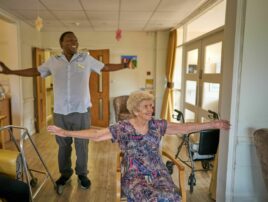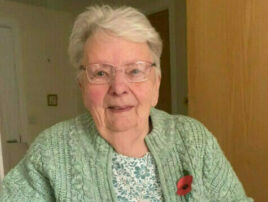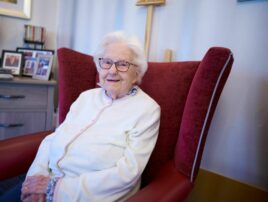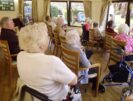Monday 5th September 2022
My story - Robabeh
As a motherless child living in a small village in Iran, Robabeh’s upbringing was tough. But God had a plan to bring her to Him. Now 92 and living in our care home Shottermill House in Haslemere

Robabeh’s mother died when she was aged only five or six and her father remarried. Sadly, her step-mother did not treat her well. “She used to mock me in front of other people,” Robabeh recalls. “I was very unhappy.”
Robabeh couldn’t wait to leave her home in the village of Chatrood in Kerman Province, South East Iran. At the age of 16 she went to study nursing at the Christian Hospital in the city of Kerman. “For me it was a way out,” she says. Robabeh was very studious and excelled in her studies. However, she came very close to losing everything. One day, she got into an argument with a Christian student and became so angry that she slapped her. As a consequence, Robabeh was kicked out of the nursing school.
“I had nowhere to go, I couldn’t go home because my stepmother didn’t want me,” says Robabeh. She appealed the decision and, thanks to her excellent academic record, she was allowed to return. “The doctor in charge, Dr Wild, agreed that I could come back and finish my studies as long as I promised not to cause any more trouble.”
Robabeh then moved to the Christian hospital in the city of Shiraz to gain further experience of nursing as well as experience in midwifery. It was here she met a lady who would change her life, Sister Muriel Tisdall. “She was very kind to me. She loved me like her child,” says Robabeh. “She was the biggest influence in my younger life. I will never forget her love for me.”
Robabeh was given a room in the sisters’compound where there was a Bible next to her bed. “No-one ever forced anything on me. Sister Tisdall said, ‘The Bible is there if you want it.’” There was also a prayer meeting every morning, but Robabeh was told that there was no expectation she had to go.



However, the kindness of Sister Tisdall and the other nurses made a deep impression on her. Whenever they had lunch they asked if she wanted to join them. And so she started to read the Bible and to go to the prayer meeting. It was through encountering God’s Word and the loving witness of these ladies that Robabeh felt compelled to put her trust in Christ.
When Robabeh told her father she has become a Christian, he rejected her. “He said, ‘You are not my child anymore,” she says. Robabeh started going to a church in Shiraz with others who had converted from Islam. It was here she met the man who was to become her future husband, Abdulmasih. Like Robabeh, he had lost his mother at a young age and he was sent to a boarding school run by Christians where he became a believer. He had been born Abdul Ali but he changed his name to Abdulmasih, meaning servant of Christ. On moving to Shiraz, he met Reverend Norman Sharp, a missionary to Iran, who became a spiritual father to him.
Robabeh and Abdulmasih were engaged in 1954, a commitment marked in Iranian culture with a special ceremony. Before they officially married, Robabeh had the opportunity to come to the UK to continue her midwifery studies, which she saw as her vocation. “I asked Sister Tisdall what she thought, and she said, ‘Why not?’ She wrote a reference for me.”
Robabeh came to the UK in 1955, spending time at the Bermondsey Medical Mission and then in Cardiff in a home for single mothers. It was steep learning curve as Robabeh spoke almost no English when she arrived.
In 1957 she returned to Iran and she and Abdulmasih married. Her father refused to come to the wedding – bound by his culture and beliefs, he would not set foot in a church.
However, with the birth of their first daughter, Shekufeh in 1959, there came a step towards reconciliation. They invited him to see the baby and Abdul and Robabeh’s father struck up a rapport.



Robabeh’s father had also sought advice from his religious leader. “The leader of his sect had asked him if I still believed in God,” explains Robabeh. “My father said, ‘yes’. His leader then told him that as I believed in God he should love and accept me. This was not a typical response of those in the Islamic faith in Iran at that time.”
Further children followed – Mojdeh in 1961, Hirbod in 1962, and Ariana in 1965. Abdulmasih and Robabeh’s father went on to become great friends. When the revolution came in 1979, the church in Shiraz faced some incredibly testing times.
Horrifyingly, a week after the revolution, the leader of their church, Reverend Sayyah, was found murdered in his office. He had been beheaded. Robabeh washed his body before the burial.
The Christian hospital in Shiraz was right next to the church. A group of rebels wanted to confiscate the hospital and had planned to build a wall to separate it from the church.
Robabeh was outraged. The foundation for the wall had already been dug and so Robabeh did a very brave thing. “I lay down in the foundation and said, ‘you can build it over my dead body,” she says. Robabeh’s brave action put them off, and eventually they went away.
“I lay down in the foundation and said, ‘you can build it over my dead body,”
At the time, many people believed that the revolution would be over quickly. But things remained dangerous and difficult. Robabeh had been appointed nurse supervisor of a very big hospital in Shiraz but she was hounded out of her position on the grounds of her faith.
Robabeh then took a job as a midwife to Iran’s nomadic communities. Her daughter Ariana remembers accompanying her on her visits. “The village midwives were all scared of my mum,” says Ariana, “She was very strict. I remember they used to give me goodies to try and win her over.”
During this time she was also an active leader for the episcopal church and represented the Iranian church at conferences both at home and abroad, particularly in the Middle East.
One by one, all Robabeh and Abdulmasih’s daughters moved to the UK. Ariana married Komraan, the son of Reverend Sayyah who had been murdered at the church in Shiraz.
Sadly, Robabeh and Abdulmasih’s son Hirbod died at the age of 38. Like Robabeh, Abdulmasih was a nurse but he suffered from kidney problems and was eventually unable to work due to ill-health.
In her role as a midwife, Robabeh continued to face intimidation from the authorities and was advised to take early retirement. Robabeh and Abdulmasih often came to visit their daughters in England, staying two, three or six months at time as it was expensive and difficult to travel.
Abdul eventually died of kidney failure in 1992. Robabeh settled in the UK and now lives at Shottermill House, where her daughters often visit. She enjoys reading the Bible with our Hummingbird Joanna, Psalm 23 and the letter to the Philippians being favourite passages. The country of Iran remains close to her heart and she prays that many people there will come to know the love of Christ just as she has.
This story first appeared in the Autumn edition of The Pilgrims' Magazine. For more great stories, why not sign up for The Pilgrims' Magazine now?
Find out more about life with us...

The Way We Care
Our unique approach to ensuring that older people have all that they need to flourish in their later years

Meet the volunteer... Evie at Shottermill House
Sixth form student Evie is a volunteer at Shottermill House in Haslemere. She told us how spending time with older people has helped inspire her to pursue a career in medicine

BBC Radio York - interview with Wayne, Senior Carer
The second World Day for Grandparents and the Elderly took place on 24th July. Wayne, Senior Carer at Emmaus House in Harrogate, took to the airwaves to share why he loves working with older people


































